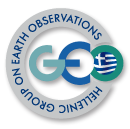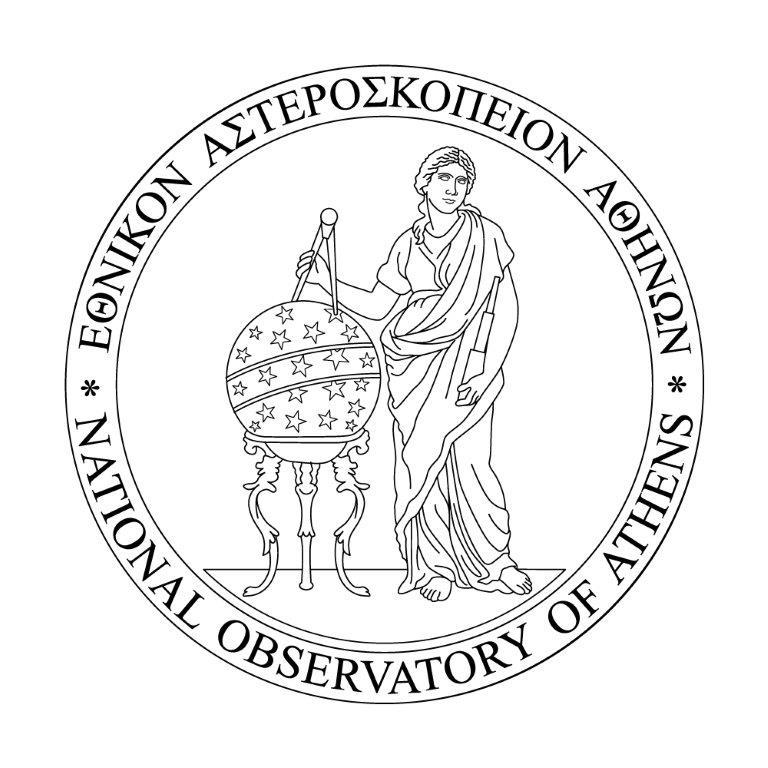High Level Working Group (HLWG)
Prof. Zerefos S. Christos
Member of the Academy of Athens
Head of the Research Center for Atmospheric Physics & Climatology
Programme Board (co-chair)
Dr. Gerasopoulos Evangelos
Research Director of the Institute for Environmental Research & Sustainable Development, National Observatory of Athens
Dr. Kontoes Haris
Research Director of Institute for Astronomy & Astrophysics, Space Applications and Remote Sensing, National Observatory of Athens
Dr. Gerasopoulos Evangelos
Research Director of the Institute for Environmental Research & Sustainable Development, National Observatory of Athens
Dr. Chrysoulakis Nektarios
Research Director of the Foundation for Research and Technology, Hellas
Prof. Zanis Prodromos
Department of Meteorology and Climatology, School of Geology, Aristotle University of Thessaloniki
Disaster Risk Reduction Working Group
Dr. Kontoes Haris
Research Director of Institute for Astronomy & Astrophysics, Space Applications and Remote Sensing, National Observatory of Athens
Capacity Development Working Group
Prof. Balis Dimitris
Department of Applied and Environmental Physics, School of Physics, Faculty of Science, Aristotle University of Thessaloniki
Tsouni Alexia
Research Specialist at the Institute for Astronomy & Astrophysics, Space Applications and Remote Sensing, National Observatory of Athens
Urban Resilience sub-group (co-chaired Greece & ESA)
Dr. Gerasopoulos Evangelos
Research Director of the Institute for Environmental Research & Sustainable Development, National Observatory of Athens
Bailey Jennifer
Research Fellow at the Institute for Environmental Research & Sustainable Development, National Observatory of Athens
GEOSS Infrastructure Development Task Team GIDTT
Dr. Gerasopoulos Evangelos
Research Director of the Institute for Environmental Research & Sustainable Development, National Observatory of Athens
Speyer Orestis
Research Fellow at the Institute for Environmental Research & Sustainable Development, National Observatory of Athens
“Earth Observations for Climate Change Impacts on World Heritage Cities”
GEO Community Activity (co-chaired by Greece and UNESCO)
Dr. Gerasopoulos Evangelos
Research Director of the Institute for Environmental Research & Sustainable Development, National Observatory of Athens
Professor Jyoti Hosagrahar
Deputy Director for the World Heritage Centre at UNESCO
j.hosagrahar(at)unesco.org
GEO‐CRADLE: GEO Capacity Building in North Africa, Middle East, Balkans, Black Sea GEO Initiative
Dr. Kontoes Haris
Research Director of Institute for Astronomy & Astrophysics, Space Applications and Remote Sensing, National Observatory of Athens
EIFFEL – Revealing the role of geoss as the default digital portal for building climate change adaption & mitigation applications (2021 - 2024)
Cure – Copernicus for Urban Resilience in Europe (2020 - 2022)
e-shape – EuroGEO Showcases: Applications Powered by Europe (2019 – 2023)
SMURBS/ERA-PLANET – SMart URBan Solutions for air quality, disasters and city growth (2017 – 2021)
IGOSP/ERA-PLANET – Integrated Global Observing Systems for Persistent Pollutants (2017 – 2021)
GEO-CRADLE – Coordinating and integRating state-of-the-art Earth Observation Activities in the regions of North Africa, Middle East, and Balkans and Developing Links with GEO related initiatives towards GEOSS (2016-2018)
BEYOND – Bulding a Center of Excellence for EO based Monitoring of Natural Disasters (2013 – 2016)
EOPOWER – Earth Observation for Economic Empowerment (2013-2015)
IASON – Fostering sustainability and uptake of research results through Networking activities in Black Sea & Mediterranean areas (2013-2015)
BALKAN GEONET – Towards Inclusion of Balkan Countries into Global Earth Observation Initiatives (2010-2013)
OBSERVE – “Strengthening and development of Earth Observation activities for the environment in the Balkan area” (2010-2012)
May 2017
The Greek GEO Office hosted the 6th GEO Programme Board Meeting in Athens, May 2017.
Agenda and the outcomes of the meeting.
May 2015
The Greek GEO Office hosted the 6th Evaluation Team of GEOSS, 12-14 May 2015.
The corresponding report can be found here.
October 2014
2nd South Eastern Europe GEO Workshop on Integrating Earth Observation Data and Services for Monitoring the Environment and protecting the Citizens, 20 and 21 October 2014. Information
June 2014
International Conference “Adaptation Strategies to Global Environmental Change in the Mediterranean City and the Role of Global Earth Observations”, 10 & 11 June, 2014. Information
8th GEO European Projects Workshop (GEPW-8), 12 and 13 June. Information
April 2010
4th GEO European Projects Workshop, 29-30 April 2010, Athens , Greece. Information
October 2009
Festival “Les Rencontre de la Terre”, Athens, Greece. Held from 12 to 15th of October 2009 under the patronage of the City of Athens by “Conferences sans Frontieres” and the Mariolopoulos Kanaginis Foundation and under the support of various Greek and French partners. Information
June 2009
8-10 June 2009, Athens, Greece: GEO South-Eastern Europe and Eastern Mediterranean Symposium on “Earth Observation Services for Monitoring the Environment and Protecting the Citizens”. The main goal of this Symposium was to inform countries that have not yet joined GEO about the benefits of participating in GEOSS, how to contribute to its construction and how to access and apply the products and services it provides.
April 2009
27-28 April 2009, Athens, Greece: The Greek GEO Office hosted the 9th Capacity Building Committee Meeting.
June 2008
9-13 June 2008, Athens, Greece: A series of (regional) GEO Workshops organized by the GEO Coastal Zone Community of Practice and the IGOS Coastal Theme in partnership with GOOS and GTOS – First Regional Workshop – Observing System Requirements for Managing and Mitigating the Impacts of Human Activities and Coastal Inundation in the Med Region. Report and CZCP upcoming events
June 2007
13 June, 2007, National Observatory of Athens, Athens, Greece: Informative Meeting “The Group on Earth Observations (GEO) and the potential involvement of Greek Scientific Society”.
FireHub is integrated to the European Fire Fire Information System (EFFIS), and to the web system of the Global Fire Monitoring Center of the International Strategy of UN for Disaster Reduction (UNSDR). Users: fire brigade authorities, Copernicus EMS Risk and Recovery, ministries, organizations for forest protection and territorial recovery and planning, WWF, private sector entities, and local authorities.
Air Quality provides real and near-real time information from satellites in-situ and IoT networks is delivered to the region of Attica to monitor pollution events due to anthropogenic and natural sources, including wild-fires and industrial accidents, that have direct or indirect impact on health.
COVID-19 is part of the Center’s wider initiative to deliver reliable and timely reporting to the general public at this critical time.
Monitoring SDGs at the national level constitutes a frame of collaboration between GGO and ELSTAT, working on the use of EO, reaching down to the city scale, where/when possible. An MoU is in the works to cement and set a stepping stone for future activities.
HNSDMS(The Hellenic National Sentinel Data Mirror Site) is part of the ESA Mirror Sites of Collaborative Ground Segment ecosystem and serves as a hub for the collection, management and distribution of large volumes of satellite data and products gathered by Sentinel -1, -2, -3, 5P missions. Users: ministries, civil protection agencies, research teams.
Sentinels internationaloperational ground-based collection and global distribution centre for satellite missions (known as Sentinels GreekHUB) is part of the EU’s ground-based space program infrastructure for Global Observation and Monitoring (Copernicus). Users: NASA, NOAA, Australia Geophysics and the United States Geological Survey (USGS).
FloodHUB (Flood monitoring service) is activated as soon as a major flood event occurs and gives a near-real-time picture of the disaster using hydrological and hydraulic modeling and special machine-learning technologies. Users: Hellenic Fire Brigade and Greek Ministry of Infrastructure and Transport (DAEFK- Natural Disasters Damage Recovery Directorate), municipalities, Region of Attica, civil protection.
GeoHUB (Geohazards monitoring service using satellite radar interferometry) is an ecosystem of services for monitoring geohazards. It exploits primarily Synthetic Aperture Radar imagery and employs interferometric techniques to assess ground deformation. Users: researchers, Greek Ministry of Infrastructure and Transport (DAEFK- Natural Disasters Damage Recovery Directorate).
SolarHUB(Nowcasting solar energy continuous monitoring service) provides data and maps of the surface solar radiation and energy in real-time for the European and North African regions. Users: energy sector (PPC Renewables SA, Hellenic Electricity Distribution Network Operator (HEDNO), Ministry of Environment and Energy, Ministry of Energy of Egypt, private companies.
AgriHUB(Satellite technology as a tool to shape agricultural policy and ensure food security) utilizes state-of-the-art artificial intelligence algorithms for the monitoring of food security, the control of the Common Agricultural Policy (CAP), but also for precision agriculture. Users: OPEKEPE, ELGA, Ministry of Agriculture, private companies.


